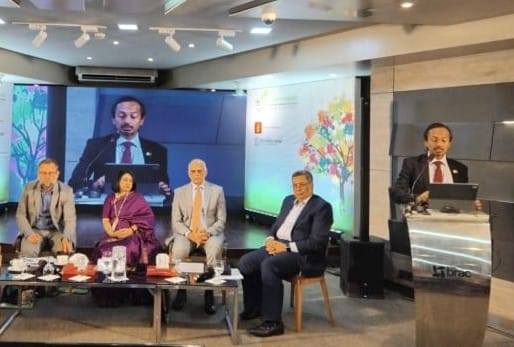Bangladesh has strong potential to emerge as a key player in the global carbon market, but it must now translate its commitments into concrete action, Danish Ambassador Christian Brix Møller said on Saturday.
Speaking at the opening session of CPD Climate Week 2025, organised by the Centre for Policy Dialogue (CPD) in Dhaka, Møller said the recent COP29 agreement in Baku—which operationalised Article 6 of the Paris Agreement—has created new opportunities for countries like Bangladesh to trade carbon credits and attract green investment.
“The carbon market could be Bangladesh’s next frontier for sustainable investment,” the ambassador said, urging the country to move from “talk to action” in its climate response.
The four-day event, held under the theme “A World Beyond Crisis: Climate Solutions That Work,” began with a call for measurable, accountable, and inclusive climate action ahead of COP30, to be hosted by Brazil next year.
CPD Executive Director Fahmida Khatun said climate change is not merely an environmental issue but a development and justice challenge.
“The world often views Bangladesh as a story of resilience, but we want to be seen as a story of transformation — a country confronting climate change with innovation, inclusion, and courage,” she said while inaugurating the event.
Speakers at the session—including diplomats, economists, and policymakers—stressed that Bangladesh’s climate strategy must evolve from isolated adaptation projects to a system-wide approach based on data and measurable targets.
Brazilian Ambassador Paolo Fernando Dias Feres said both Bangladesh and Brazil share the twin challenges of deforestation and energy transition. “We must move from despair to action,” he said, linking the Dhaka discussions to Brazil’s upcoming COP30 summit.
UNDP Senior Economic Advisor Owais Parray warned that “we are standing at the edge of a cliff,” as biodiversity loss and environmental degradation now pose serious economic risks.
“All of these have an economic impact,” he said, adding that countries like Bangladesh, which have contributed least to global emissions, continue to bear the worst consequences.
Parray called for a “green revolution” that decouples growth from carbon emissions. “It’s not about stopping progress — it’s about finding smarter ways to grow,” he said.
Monzur Hossain, member of the General Economics Division at the Bangladesh Planning Commission, emphasised the need for an adaptive framework that integrates both mitigation and broader climate priorities.
Throughout the discussion, participants highlighted the critical role of youth engagement, private sector participation, and technology in driving Bangladesh’s climate transition.
Fahmida Khatun said CPD Climate Week aims to serve as a collaborative platform for government, businesses, and grassroots actors to exchange practical ideas and build momentum for Bangladesh’s position at COP30.

